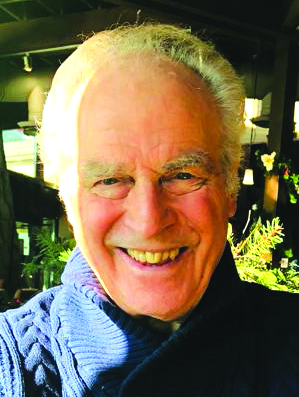Nudged toward oneness
Imagine yourself in my position. Seven years ago I, a lifetime non-believer, surrendered to a student’s invitation and joined her at her church in a small wooded area in a suburb of Vancouver. I had researched the church: its mother church was the Dutch Reformed Church (renamed the Protestant Church in the Netherlands after a 2004 merger). As a Holocaust historian, I knew about the Dutch church’s anti-Nazi activities during the war—and as well, I was pleased to see that the Dutch church had accepted same-sex marriage and the ordination of LGBTQ people for the ministry.
I arrived early, formally dressed, as I thought appropriate. (I soon realized I stood out amidst the shorts and T-shirts!)
When I walked through the doors of the little church, I experienced one of those instants Wordsworth called “spots of time” or Freud (following his friend Romain Rolland) “oceanic experiences”: a feeling of oneness with everything around me.
I soon joined the church and enjoyed every moment of the services—except Communion, which I was not, by Reform conventions, permitted to share. Why? Because I had never been baptized.
So, as I said, imagine yourself me. I used to sit at the aisle, and when Communion was called, a line would form beside me as the congregants prepared for the ritual. But here’s the moment: one Sunday, as the line began to move, it suddenly stopped. I turned around … and there was a very tall blue-eyed elderly man of Dutch descent, whom I had earlier befriended, his long arms held out wide, blocking, for a moment, the other congregants’ march to the pulpit. He looked down at me, and with mock irritability, nodded for me to get up and join the procession.
What option did I have?
So I walked up to the pastor, a gentle-speaking, warm and friendly Korean Canadian, and held my hands out—right hand on top as I’d seen—and took the wafer, put it in my mouth, and let it melt.
There I was, in front of everyone, participating in the Last Supper, the body of Christ melting on my tongue. How many millions upon millions—and this ran through my mind!—had I at that moment joined in the rite’s 2000-year history? The experience was overwhelming.
My experiences entering the church and taking part in Communion were moments of what the eminent Canadian Christian philosopher Charles Taylor would call “cosmic connection.” His latest book, Cosmic Connections: Poetry in the Age of Disenchantment, which came out last year, speaks of the power of the arts to evoke what he calls “cosmic consciousness.” I read and reviewed his book, and as a lifetime professor of the humanities, I knew exactly what he meant.
“It is poetry, not philosophy, which can tell the deep truth of our age,” he writes.
As a musician, I must add that music also can evoke this feeling of connectedness; it has certainly evoked it more than once in me. For the tenth anniversary of the Sept. 11, 2001 terrorist attacks in New York, the New York Philharmonic arranged a special concert for the bombing’s survivors, families, and firefighters. I had a connection with a flutist in the symphony and was given a ticket to attend. The featured symphony was Mahler’s second, the Resurrection Symphony, which requires a large choir. Mahler, like me a converted Jew, saw in the Resurrection a symbol for hope and meaning amid humanity’s suffering.
When the symphony reaches its ecstatic climax, the choir sings out fortissimo the passionate words, “Believe, my heart, believe! All is not lost! What has perished will rise again. We die, so as to live.”
And there I was, amid an audience of people who had lost their loved ones to those searing flames, listening to the words which echoed the meaning of the Resurrection: “The dead will arise,” the chorus sang, “and be borne to God.” Can you imagine the experience, and what it meant to the 9/11 widows and families? Yes, I was a non-believer then, but I felt my heart opening wide to the promise of the Resurrection.
Christians, but not only Christians of course, are constantly being nudged into awareness of the presence in their lives of cosmic connection: we are, after all, natural beings, but beings who, made in God’s image, share such extra-natural faculties as free will, symbolic language, conscience, self-reflection, artistic creativity, altruism and moral values. Charles Taylor’s “sense of connection to the cosmic orders” has become increasingly elusive in our age of secularism, although achieving this connectedness is still of course the goal of meditation and religion. (According to some scholars, the word “religion” etymologically means “a tying back together”).
A very dear friend in conversation with me recently referred to herself as a “cradle Christian,” as she was born and raised Anglican. I said to her, “I guess that makes me a coffin Christian!” But I have found that adopting Christianity at a late age has meant that such “connecting” rituals as prayer, baptism, hymn-singing and so on have a very strong effect on me. “Cosmic connectedness” comes to me especially in prayer. Since prayer is a new experience for me, it is often an arresting, almost intoxicating experience. No less is hymn-singing in my newly-adopted Anglican church where I have joined the choir (I left the Christian Reformed Church when, just after the COVID-19 pandemic, it overruled its mother church on same-sex union issues).
In retrospect, it’s hard to express the privilege I, as a “coffin Christian,” feel it is to belong to the Anglican church with its progressive policies. And I pray that others will learn to feel, like me, the “cosmic connectedness” that comes, as the song goes, with the privilege “to carry everything to God in prayer.




